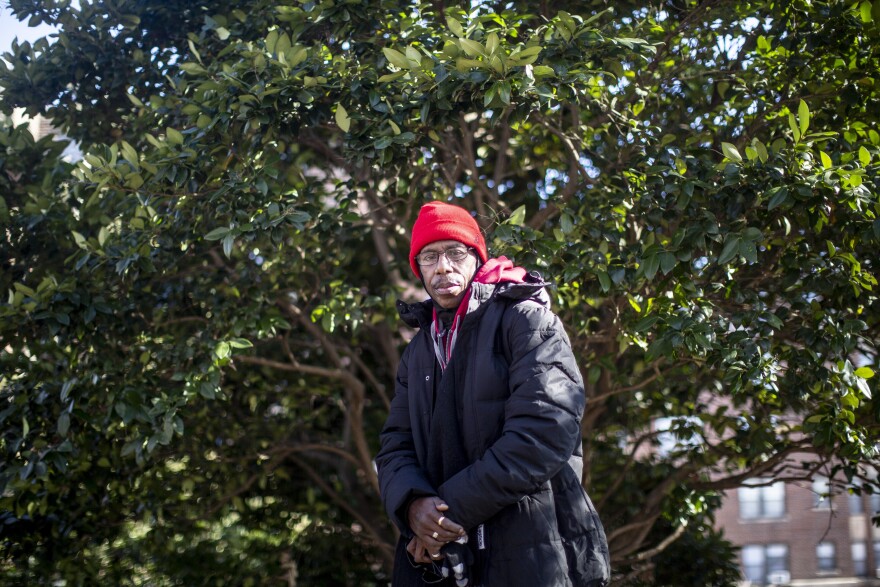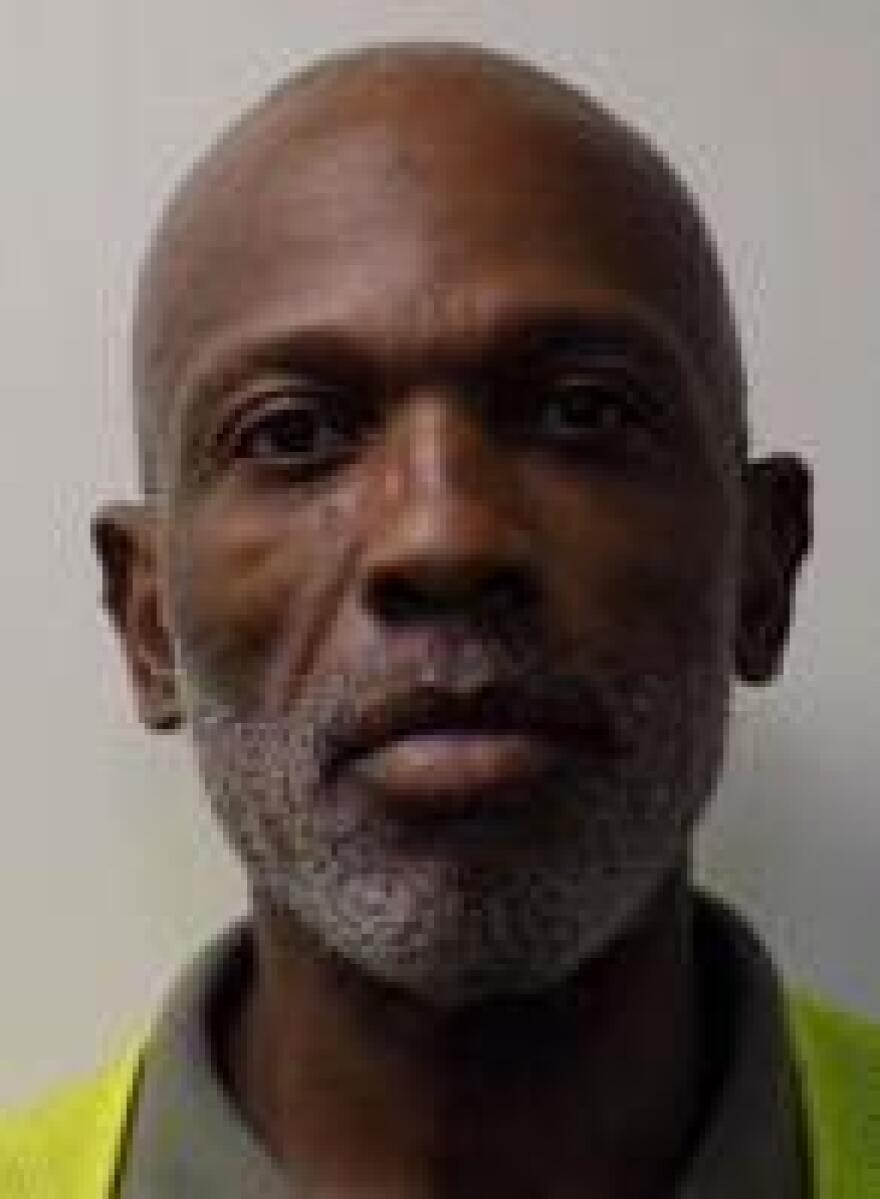Updated on Wednesday, Oct. 21, 2020, at 10:52 am ET:
Since this story's publication, Curtis Lang Sr., 62, a convicted rapist who repeatedly failed to register as a sex offender, was arrested by the U.S. Marshals Service in Washington, D.C. He was charged with one count of failing to register as a sex offender, according to federal officials. Lang was arraigned Oct. 20 in D.C. Superior Court. He pleaded not guilty and was released, according to court records. He is due back in court in March 2021.
Inside the sprawling two-story tan and coral stucco building on New York Avenue in Northeast Washington, D.C., is a men's homeless shelter that once served as a halfway house run by the government.
It's a place that some 20 registered sex offenders call home — according to the city's sex offender registry. But at least one-third of them don't really live there, and D.C. authorities have no idea where they are.
The men are among the more than 25,000 convicted sex offenders and predators across the U.S. who have absconded, their whereabouts unknown to law enforcement or the victims — often children — whom they sexually assaulted or abused, an NPR investigation has found. Tens of thousands of others are out of compliance with sex offender registry laws.
"Law enforcement are losing people," says Kelly Socia, an associate professor of criminology and justice studies at the University of Massachusetts, Lowell.
Like so much else in American life, enforcement of sex offender registries across the country has been upended by the effects of the coronavirus pandemic. Many states with in-person monitoring and registration have had to search for alternatives. Some states have seemingly stopped enforcement altogether.
But most of the shortcomings predate the pandemic. NPR reviewed sex offender registry databases and records from all 50 states and the District of Columbia and found that a system intended to keep track of sex offenders often fails the very people it was designed to protect.
Many state registries are rife with errors, such as wrong addresses or names of offenders who died as long as 20 years ago. Others include the names of hundreds of offenders who have failed to verify their whereabouts in more than a decade.
The registries also list absconders whom law enforcement say they can't find but often are hiding in plain sight. Like a Colorado man — one of that state's 100 most wanted sex offender fugitives — on the run since 2016. NPR found him in Washington state, where he has never registered as a sex offender, according to public records.
Some sex offenders commit additional sex crimes after failing to tell police their whereabouts. In Missouri, for instance, a man who pleaded guilty in 1991 to sexually abusing a 5-year-old girl was convicted in 1998 and in 2017 of sex crimes against other minors, after moving between states without registering.
"The registry really doesn't work," Socia says. "It's a bloated, inefficient system that is incredibly expensive to maintain. I don't think it really protects anybody."
A federal law passed in 1994 known as the Jacob Wetterling Act requires states to establish registration programs for people convicted of sex crimes or crimes against children. The law was named for a Minnesota boy abducted by a man as the 11-year-old rode his bicycle home from the store in 1989. That law also requires states to verify addresses of convicted sex offenders every year for at least 10 years.
Since then, the laws relating to sex offenders have been amended to include such things as making the registries publicly accessible, placing certain juveniles on the registry and requiring law enforcement to notify the public when sex offenders move into the community.
Slipping through the system
NPR combed through those registries and counted tens of thousands of offenders who are considered absconders or whose locations are unknown. Among them were men whom NPR found easily using public records.

Like Curtis Lang Sr.
Lang, 61, was convicted in 1994 of raping an ex-girlfriend in her Washington, D.C., home. He says that he was high on PCP when the woman came home, that he raped her and that she tried to run away.
"I was out of my mind," Lang recalls. "But we did have rough sex and she tried to get away from me and I put my hands on her, yeah."
Lang, who served a decade in prison for the rape, was required to register as a sex offender and update that registration every three months for life. But it has been five years since he registered, according to D.C.'s sex offender registry.
NPR found Lang after checking court documents in Maryland and discovering a traffic citation from May 2019 for driving with an expired license. The court record listed an address in Northwest D.C., about 9 miles from the address he listed on D.C.'s public sex offender registry.
Authorities haven't gone after him for failing to register, despite stopping him for several traffic violations, including the 2019 incident.
"That's the system," Lang says. "I can't help it if I slipped through the system, the cracks, you know? That's on them."
The agency that registers and monitors sex offenders in the nation's capital is called the Court Services and Offender Supervision Agency, or CSOSA. Authorities there are supposed to report noncompliance to the Metropolitan Police Department, which acts as an enforcer.
"When we're notified of a violation, we do everything we can to bring the offender into compliance," says D.C. Police Commander Leslie Parsons, who oversees the sex offender registry.
That's how Jimmy Ferguson came to the department's attention. He is required to register as a sex offender every 90 days because of a conviction for assault with intent to commit rape. But he stopped registering several years ago, records show.
CSOSA said it sent a violation notice about Ferguson to police in March 2017, and again two years later, and police told NPR they tried to find him.

Ferguson said no one came looking for him in the most obvious place — the address on his sex offender registration form. While Ferguson admitted he wasn't complying with the registration law at the time, he has been living in the same modest second-floor apartment across the street from a school in Southeast D.C. for years, records show.
"I've been living right here going on four years," he told NPR. "If you can find me, why the law can't find me?"
"This is ridiculous, man. I'm not hiding," he added.
Ferguson registered six weeks later, records show.
Alissa Ackerman, an assistant professor of criminal justice at California State University, Fullerton and a sex crimes expert, said she understands why offenders don't register.
"The burdens that come with it are tremendous," Ackerman says. "The shame that it brings upon you is tremendous."
Missing but not a priority
When offenders don't register, state officials throughout the country acknowledge, finding them can be tough. And that difficulty is made worse because law enforcement agencies often don't place a high priority on going after them, even though authorities know the sex offenders have broken the law.
In Illinois, 12.5% of the state's 32,249 sex offenders are missing or have failed to comply with reverification laws. Police there often catch absconders during routine traffic stops or while responding to domestic calls, according to Tracie Newton, the program administrator for the state's sex offender and murder registries.
"Many times, that's how they're found," she says, adding that it is the job of local police or sheriff's departments to track offenders so that they don't abscond.
In Nevada, where 7.5% of the 29,271 offenders are missing or have failed to comply, authorities rarely check to ensure that sex offenders live where they say they do, says Mindy McKay, who oversees the records, communications and compliance division of the Nevada Department of Public Safety.
"Short of implanting a chip in someone ... we can't keep track of people like that," she says. "If they abscond, they abscond. There's nothing we can do about it."
Chelsea Ross, who oversees Nevada's sex offender registry, says the number of absconders or those who are not up to date with their registration is likely to increase because of the coronavirus. That state and others shut down in-person registration offices when the pandemic hit, forcing sex offenders to register online, by phone or by mail, and halting law enforcement efforts to do in-person verification checks.
"We didn't do an announcement to tell the public or to tell the offenders we weren't doing in person," Ross says. "We thought that would open a door for people not to check in. We didn't want offenders to say, 'Hey, nobody's going to be checking on us.' "
Derek Carmon, a spokesman for the Portland Police Bureau in Oregon, says his agency has also halted residence verifications.
"Patrol officers were helping check residences of sex offenders, but since the pandemic ... no checks are being completed by patrol," Carmon says.
NPR also found at least a dozen states where some of the longest-missing offenders actually had died – something the states could have verified with their own records.
In Arkansas, for instance, authorities say Leroy Hair has been missing for nearly two decades — 7,153 days. Hair received a 40-year sentence for a 1979 rape and registered as a sex offender for life on the eve of his release in November 2000.
"He registered, then disappeared," says Paula Stitz, manager of that state's sex offender registry.
Public records show that Hair died in 2001.
A danger to the community again

Mistakes in the registries can have dire consequences. NPR found examples of unregistered offenders moving undetected — sometimes from one state to another — and committing additional sex crimes.
Austin Kelly, 26, was released from prison in March 2019 after serving 10 years for attempted rape of a child in Tennessee. Officials there placed him on community supervision for life, and he was forced to register as a sex offender.
Within six weeks of leaving prison, Kelly absconded, records show. He landed a job 600 miles away in Owasso, Okla., at the Sonic Drive-In and found a place to live. He filled out a sex offender registration form, but when the Tulsa County Sheriff's Office mailed the address verification form to him, he didn't send it back as required by law, police said. That made him an absconder in Oklahoma, too.
Late last year, police said that Kelly walked into a McDonald's across the street from his job and followed a 3-year-old girl and her 7-year-old brother into the men's bathroom. He was arrested 13 days later and charged with sexual abuse of the girl, along with aggravated possession of child pornography. He was convicted in December and sentenced to 35 years in prison.
Sexual abuse survivor Kristen Trogler says she believes the system created to track sex offenders is broken.

She has gone to the Missouri sex offender registry over the years looking for one man in particular: Robert Maurer. He went to jail for sexually abusing her when she was in kindergarten.
She didn't find him.
That's because once Maurer was released from prison for assaulting her, he failed to register at least twice — in Missouri and in Florida, records show. Authorities had no idea of his whereabouts for months at a time.
"The system doesn't work," says Trogler, who lives in St. Louis. "What's their punishment for not registering? A little bit of time in jail? It's not enough."

Trogler first met Maurer when she and his daughter sat next to each other in kindergarten at the Oak Hill School in St. Louis and quickly became best friends. When the class took a field trip, Trogler's mother and Maurer chaperoned. Soon after, she allowed Maurer to babysit while she worked.
That's when the inappropriate touching began.
"It started off slowly," Trogler recalls. "I remember thinking it was not right."
Five years after his release for that crime, police arrested Maurer for molesting two girls, ages 12 and 13, in his home over a two-year period. Maurer pled guilty in 1998 to child molestation and statutory sodomy, and received a 10-year sentence.
After being released in December 2007, Maurer moved to Florida and ignored the requirement to register. He was charged with failure to register and got a six-year prison sentence.
Maurer was released in August 2013 and returned to Missouri without reporting his new address within three days, as required by law. While an absconder, Maurer sexually abused another 12-year-old girl — a relative with whom he lived. Authorities charged him with statutory sodomy and failure to register as a sex offender.

A jury convicted Maurer of a lesser charge of attempted statutory sodomy and failure to register in 2017, and a judge sentenced him to life in prison without the possibility of parole. Trogler testified at his trial, calling him a real-life "boogeyman."
"He is what nightmares are made of," she told the court.
Thirty years have passed since Trogler's abuse, but she relives it daily. She says she turned to drugs and alcohol as a teen.
"I was in pain," she told NPR. "I wanted to not be in this black hole that I'm still in every single day."
Now, at 36, she's divorced with three children. She lives in a small rented house in St. Louis and makes ends meet with a county tax-collecting job.

Trogler's dining room table is filled with prescription bottles: pills for anxiety, depression and bipolar disorder. She sees a therapist, a decision she made three years ago.
"He's a monster," she says about Maurer. "He stole everything from me. I hate him."
Trogler says law enforcement fail people like her and others by not keeping track of offenders who don't register and abscond.
"The system is broken," Trogler says. "I don't know if there is a way to fix it."
Researcher Barbara Van Woerkom contributed to this report.
Copyright 2023 NPR. To see more, visit https://www.npr.org.







